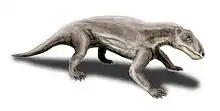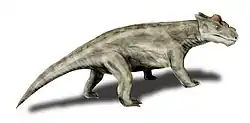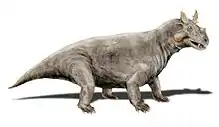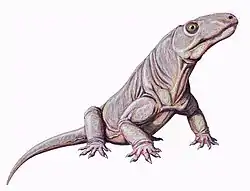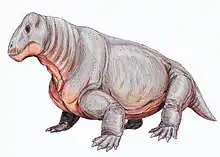Phthinosuchus
Phthinosuchus is an extinct genus of therapsids from the Middle Permian of Russia. Phthinosuchus is the sole member of the family Phthinosuchidae. Phthinosuchus may have been one of the most primitive therapsids, meaning that its ancestors may have branched off early from the main therapsid line.
| Phthinosuchus | |
|---|---|
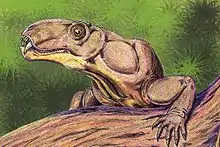 | |
| Life restoration of Phthinosuchus discors | |
| Scientific classification | |
| Kingdom: | Animalia |
| Phylum: | Chordata |
| Clade: | Therapsida |
| Suborder: | †Dinocephalia (?) |
| Family: | †Phthinosuchidae Yefremov, 1954 |
| Genus: | †Phthinosuchus Yefremov, 1954 |
| Type species | |
| †Phthinosuchus discors Yefremov, 1954 | |
Discovery
Phthinosuchus was named in 1954 by Ivan Yefremov. It is currently only known from the back of the skull, as the front of the skull was lost after description. Two species, P. discors and P. horissiaki, have been described.[1]
Description
Phthinosuchus was 1.5 m (5 ft) long with a 20 cm skull, and looked much like the Sphenacodontids, such as Dimetrodon and Sphenacodon. Its temporal fenestrae were larger than those of the Sphenacodontids.[2][3] Its jaw was slender, unlike other predatory therapsids,[1] but like the other early therapsids, it was probably sprawling and carnivorous.
Classification
Phthinosuchus is a member of the suborder Phthinosuchia, which was made specifically for Phthinosuchus given that it did not fit into any other suborder.[1]
References
- Dixon, Dougal (2015). The Complete Illustrated Encyclopedia of Dinosaurs & Prehistoric Creatures. Hermes House. p. 93.
- Palmer, D., ed. (1999). The Marshall Illustrated Encyclopedia of Dinosaurs and Prehistoric Animals. London: Marshall Editions. p. 189. ISBN 1-84028-152-9.
- "Phthinosuchus discors – Palaeocritti – a guide to prehistoric animals". Palaeocritti. Retrieved 2013-06-30.
